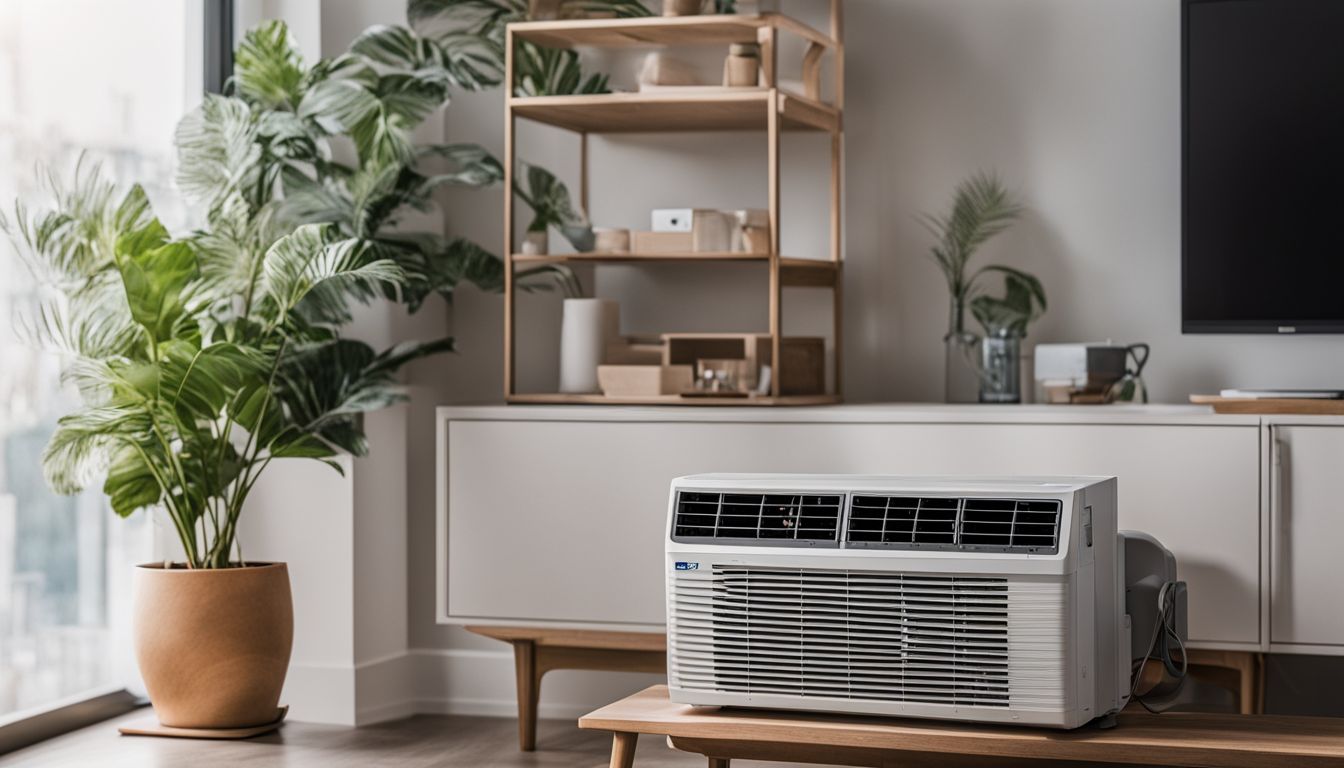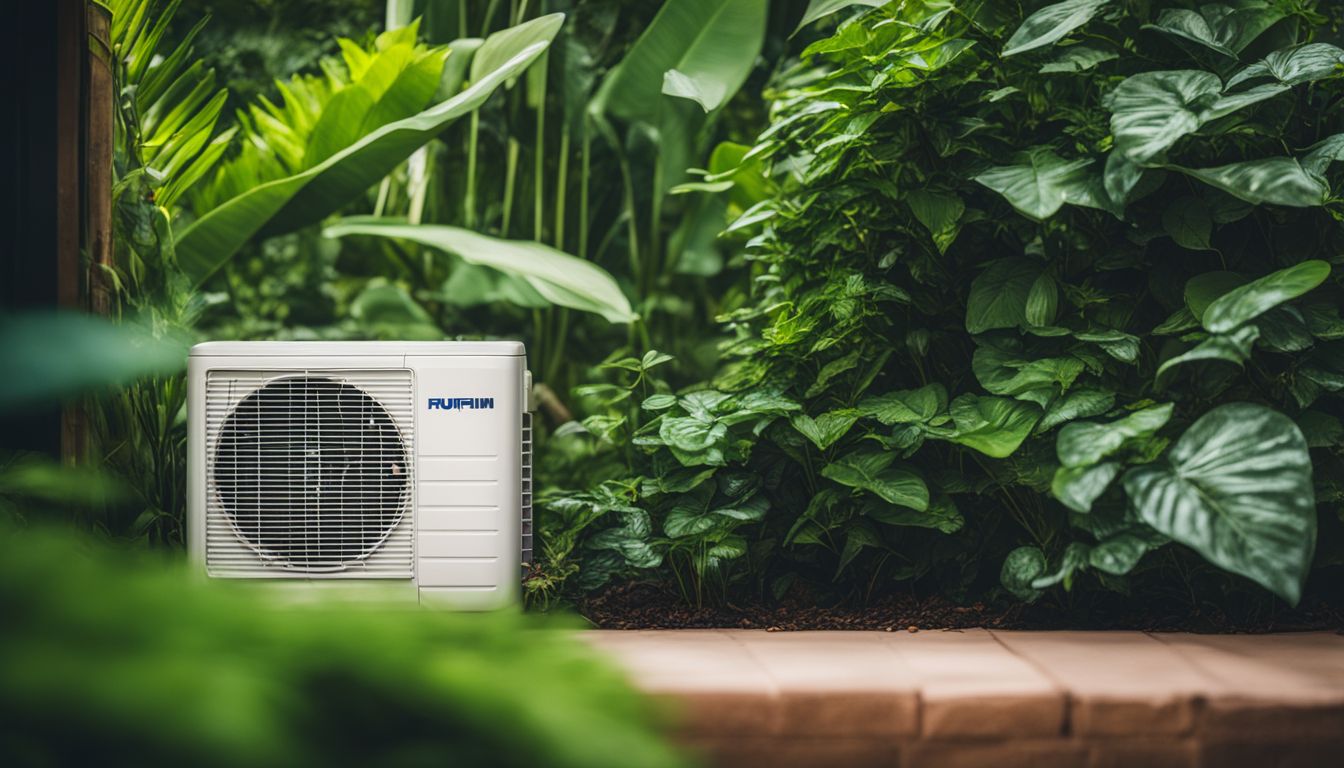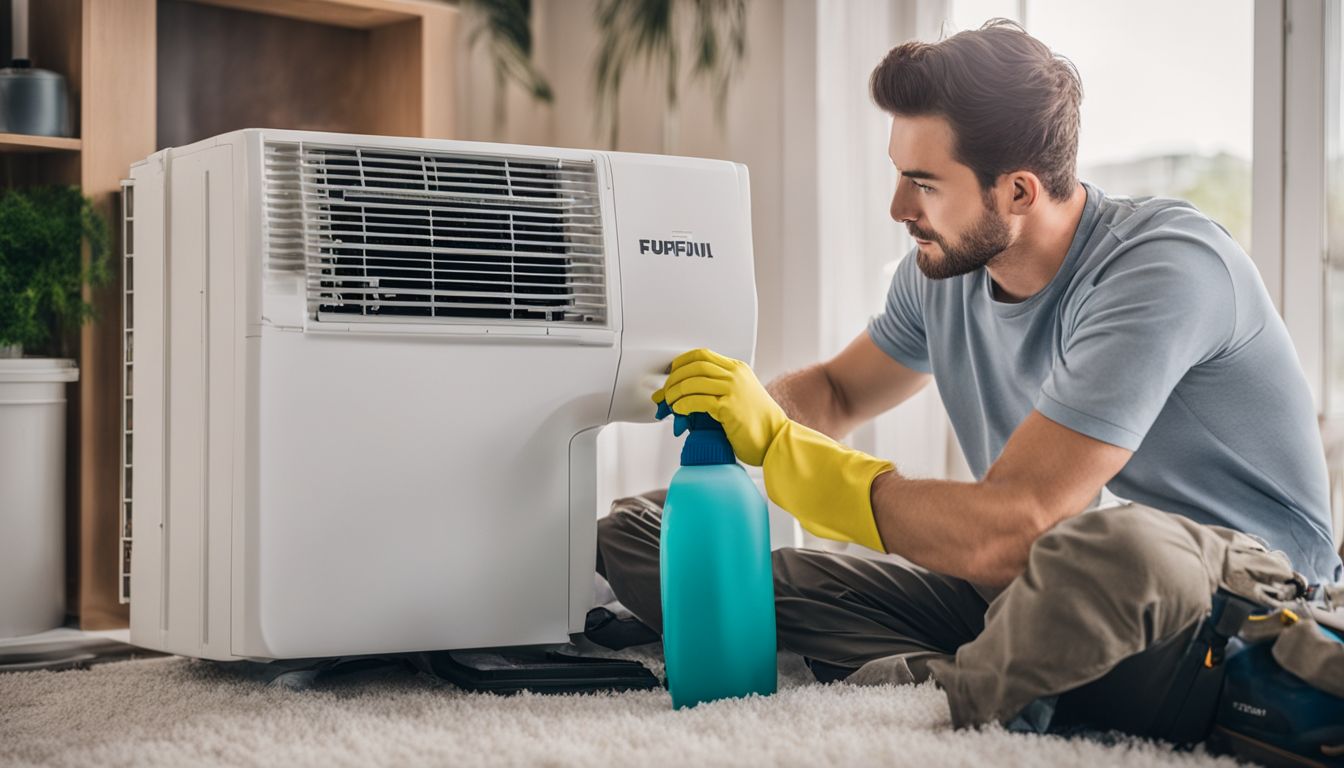As summer heats up, you might find your air conditioner struggling to keep it cool. It’s a well-known fact that an inefficient AC can send energy bills soaring. Our guide will help you decide whether it’s time to fix your old unit or invest in a new one for greater comfort and savings.
Discover smart solutions ahead!
Recognising the Signs for Aircon Repair vs. Replacement
Determining whether to repair or replace your air conditioning system hinges on crucial factors that can significantly affect comfort and costs. It’s essential to assess your unit’s symptoms, as they serve as clear indicators of its overall health and efficiency.
Age of the Unit
The lifespan of your air conditioning unit plays a critical role in deciding whether to repair or replace it. Generally, an aircon system serves reliably for about 12 to 15 years. Once your unit hits the decade mark, wear and tear from years of cooling can lead to less energy efficiency and more frequent breakdowns.
A machine nearing or surpassing this age threshold may cost you more in repairs and energy bills than investing in a new one.
Upgrading to a modern system before major failures strike could save you money over time. Energy-efficient models not only lower utility costs but also benefit the environment by reducing strain on the power grid and minimising greenhouse emissions.
If your HVAC is ageing, evaluate its performance against newer, energy-starved appliances that offer superior seasonal energy efficiency ratios (SEER) and enhanced comfort control with smart thermostats.
Frequent Breakdowns
Frequent breakdowns of your air conditioning system signal a deeper problem that temporary fixes can’t solve. Poor airflow, strange noises, odd smells, and refrigerant leaks often point to internal issues begging attention.
Regular calls to an HVAC professional become more than just inconvenient; they suggest your unit is facing significant challenges.
Repair costs add up quickly when breakdowns become part of the routine. If you constantly dial in for HVAC assistance or your air conditioner seems to have more bad days than good, it might be time to consider replacing it altogether.
Such persistent troubles are clear indicators that the reliability of your air conditioning equipment is compromised, potentially affecting not just comfort but also safety within your home.
Uneven Temperatures
If you’ve noticed uneven temperatures in different rooms, your air conditioning system might not distribute cool air properly. This can point to issues like blocked ducts, low refrigerant levels, or faulty fans.
Clogged air vents and a build-up of dust accumulation also contribute to this problem. An HVAC professional can assess the situation to determine if repairs will solve the issue or if it’s time for a new unit.
Your comfort at home should never be a compromise because of fluctuating temperatures from room to room. It’s crucial that your HVAC system functions efficiently, ensuring consistent cooling throughout your space.
If you’re experiencing hot spots despite having an active air conditioner, it could signal that parts are worn out or that the design of your existing system no longer meets the demands of your living environment.
Upgrading or repairing could restore balance and improve overall air quality.
Rising Energy Bills

Sudden jumps in your energy bills could be a red flag that something is wrong with your air conditioner. It might be working too hard due to inefficiencies or age, which leads to increased electricity use and bigger bills.
If you notice your system constantly running or struggling to maintain the right temperature, it may need a check-up or possibly replacement.
Upgrading to a new, more efficient HVAC unit often results in lower energy consumption. Not only does this mean savings on monthly bills, but it also supports an environmentally friendly choice for your home heating and cooling needs.
Keep an ear out for odd noises coming from your system—these sounds can hint at underlying issues contributing to those unexpected hikes in costs.
Decoding Air Conditioner Behavior: Frequent On-Off Cycles
If your air conditioner keeps switching on and off in rapid succession, you’re likely experiencing short cycling. This problematic behaviour can strain the system, increasing wear and tear while leading to higher energy bills.
Several factors trigger short cycling, from a clogged air filter blocking airflow to an oversized AC unit for your space, which cools rapidly and then shuts down.
Issues with the thermostat can also cause erratic cycles in air-conditioning units. It may be incorrectly positioned away from natural heat sources or have failed entirely, prompting inconsistent signals to your HVAC system.
Likewise, refrigerant leaks dramatically impact performance by preventing the air conditioner from maintaining stable temperatures—promptly addressing these malfunctions preserves your equipment’s efficiency and longevity.
Benefits of Replacing Your Aircon Unit
Delving into the advantages of updating your air conditioner, one may unveil a treasure trove of benefits that extend well beyond mere temperature control. Securing a new unit not only paves the way for substantial energy savings but also aligns you with contemporary eco-friendly standards and furnishes your space with unwavering comfort and pristine air quality.Significant Cost Savings
Upgrading your air conditioner can be a smart financial move. New, high-efficiency models can slash your energy bills significantly. Older units often work overtime to cool your home, using more electricity and hiking up costs.
By choosing a model with a higher SEER rating, you’re investing in an air-conditioning system that requires less energy to maintain a pleasant temperature.
Switching to an EnergyStar-approved HVAC system not only reduces monthly expenses but also contributes to long-term savings. Installation might seem expensive at first glance; however, the reduced operational costs will cover these initial fees over time.
With repair bills for old units adding up quickly—from minor fixes to major part replacements—the decision to replace can be financially savvy in the big picture.
Tax Incentives
Purchasing a new air conditioning system can be quite an investment, but tax incentives make it a smart financial move. If you pick a qualifying central air conditioner, these incentives can significantly reduce the upfront cost.
This makes opting for a replacement not only environmentally responsible but also easier on your wallet.
Homeowners who install energy-efficient HVAC systems don’t just enjoy lower energy bills; they may also reap benefits during tax season. The government often rewards those who contribute to energy conservation with deductions or credits.
Check which HVAC units qualify and ensure your purchase meets the required SEER (Seasonal Energy Efficiency Ratio) standards to maximise potential savings.
Warranty
Warranties can play a critical role in your decision to repair or replace your air conditioning system. If the unit is still under warranty, you could save a substantial amount on potential repairs or replacements.
Manufacturers often provide these guarantees, which serve as a promise to address any faults that arise due to defects in design, materials, or workmanship within a specified period.
Check your air conditioner’s documentation for warranty details before making any decisions. It may cover the cost of replacement parts, and labour, or even provide a brand-new unit if necessary.
Ensure qualified HVAC professionals perform any maintenance and repairs to uphold the warranty conditions. Moreover, keeping up with regular professional maintenance could extend the life of your air conditioner and help maintain its energy efficiency over time.
Environmental Advantages
Replacing your old air conditioner with a modern, energy-efficient model does more than just cool your home. It unleashes a host of environmental benefits. Newer models adhere to strict environmental regulations and use refrigerants that are less harmful to the ozone layer.
This shift helps cut down on pollutants released into our atmosphere, making each cycle of your HVAC system an eco-friendly one.
Upgrading not only contributes to cleaner air but also tackles larger issues like climate change by reducing greenhouse gas emissions. Energy-efficient units demand less power, leading directly to decreased energy consumption.
As homes and offices make this switch, the collective impact is substantial: fewer emissions mean a healthier planet for us all.
Enhanced Comfort and Air Quality
Upgrading your air conditioning unit can transform your home into a haven of comfort. Newer models optimise the temperature throughout your living spaces, ensuring no hot spots or cold draughts disrupt your relaxation.
They maintain steady cooling, which is essential for both comfort and health. Modern systems have advanced filters that trap pollutants and allergens, significantly improving indoor air quality.
Investing in a new HVAC system could be a game-changer for those suffering from allergies or asthma; cleaner air means fewer irritants circulating through your rooms. Enhanced energy efficiency cools the unit more effectively and circulates cleaner air without overworking it.
This leap in technology provides a twofold benefit: an environment that’s easier to breathe in and a comfortable space you can enjoy year-round.
Advantages of Repairing an Old Aircon System
Repairing an existing aircon may be a wise decision, offering cost-effectiveness and extending the lifecycle of systems that still have some life in them. It’s about making smart choices rather than straightforward replacements and understanding the nuances of your HVAC’s current performance and potential.
Preserving Newer Systems
Caring for your newer air conditioning systems can dramatically cut down on expensive visits from HVAC professionals. Today’s models boast sturdy components and enhanced technology, making them less prone to breakdowns and more cost-efficient in the long run.
Regular maintenance keeps these advanced units running smoothly, extending their life span and ensuring they perform at peak levels.
Investing a little time and effort into routine checks can prevent minor issues from escalating into major ones. This means cleaning filters, checking for leaks, and ensuring that the aircon unit is debris-free.
Simple actions like these preserve your system’s efficiency and save money that would otherwise go towards repairs or premature replacement. Keep your modern AC unit in top shape; it will reward you with reliable cooling power for years to come.
Adhering to the Fifty Percent Rule

Deciding whether to repair or replace your air conditioner shouldn’t be a guessing game. Use the Fifty Percent Rule as your guide. It’s simple: if repair costs approach 50% of your aircon’s value, it’s time to consider getting a new one.
This rule acts as a clear threshold for making cost-effective choices.
Imagine facing an expensive repair for an ageing HVAC system. Think about long-term savings and efficiency before spending half the price of a new unit on repairs alone. Following this rule helps you avoid sinking too much money into old equipment that may soon require more fixes or even total replacement just down the line.
Choosing to replace can also offer you the benefits of modern technology, such as improved energy efficiency and reduced environmental impact, which are not only good for your wallet but also better for our planet.
Maintenance Considerations
Efficient maintenance is crucial for keeping your aircon in top shape, but the costs can rack up if continuous repairs are needed. As your HVAC ages, its components wear out and may require more frequent service calls to deal with issues such as coolant leaks or faulty wiring.
These disruptions not only inconvenience you but also create a constant drain on your time and wallet.
Consider the long-term implications of an older air-conditioning unit that requires regular upkeep. If breakdowns become common, this might signal that it’s time to weigh the benefits of investing in a new system against ongoing repair expenses.
A fresh installation could offer a clean slate with fewer immediate maintenance demands, potentially resulting in fewer headaches and more consistent performance.
Conclusion
Deciding on repairing or replacing your aircon unit involves careful consideration of many factors. Assess energy bills, temperature consistency, and the age of your HVAC system to inform your choice.
Consult with HVAC experts who can offer tailored advice specific to your situation. Keep in mind that investing in a new system could bring long-term savings and improved safety. Ultimately, the right decision balances cost-effectiveness with comfort in your home.
FAQs
1. How do I decide whether to repair or replace my air conditioner?
Consider a cost-benefit analysis of the expenses involved in repairing your current air conditioning unit versus purchasing a new one.
2. When is it best to repair an HVAC system?
If your HVAC, including heaters and air conditioners, haven’t reached their lifespan’s end and the repairs are minor, fixing them might be more cost-effective than replacing them.
3. What should I check before deciding on repairing or replacing my air-conditioning equipment?
Assess the annual fuel utilisation efficiency (AFUE) of your furnace or boiler; if it’s low, consider updating your HVACs for better energy use and savings in the long term.
4. Can upgrading to a new air-conditioner save me money over time?
Upgrading to a more efficient model can potentially save you money due to lower running costs and decreased need for future repairs compared with older, less efficient units.





